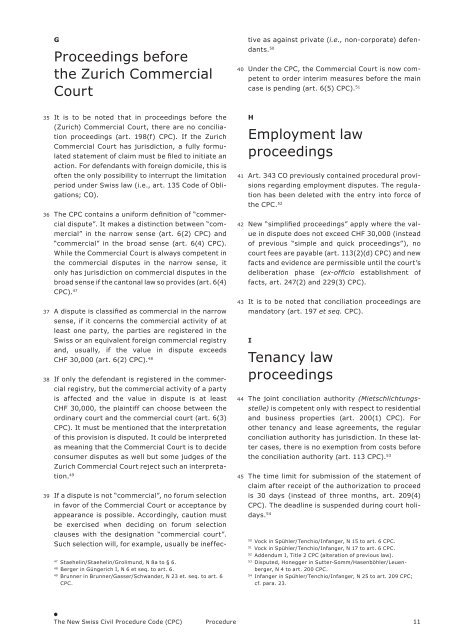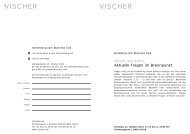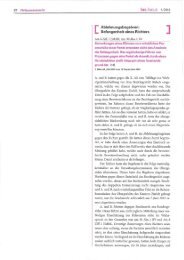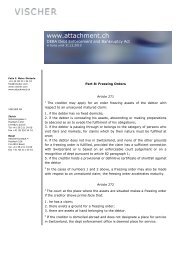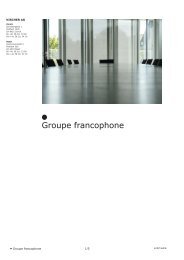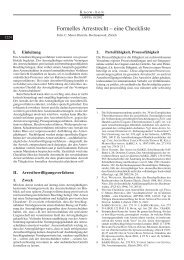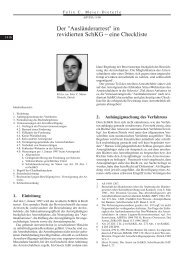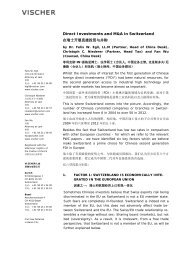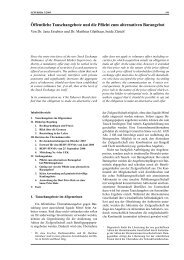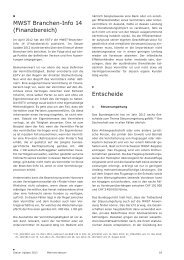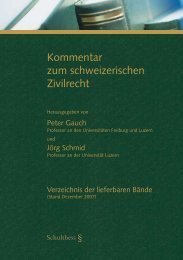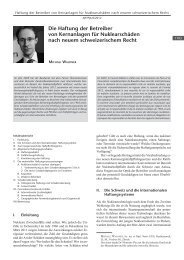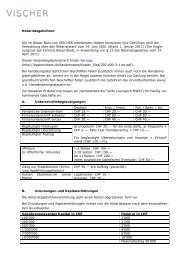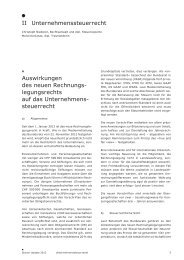The New Swiss Civil Procedure Code (CPC) - Vischer
The New Swiss Civil Procedure Code (CPC) - Vischer
The New Swiss Civil Procedure Code (CPC) - Vischer
Create successful ePaper yourself
Turn your PDF publications into a flip-book with our unique Google optimized e-Paper software.
G<br />
Proceedings before<br />
the Zurich Commercial<br />
Court<br />
35 It is to be noted that in proceedings before the<br />
(Zurich) Commercial Court, there are no concilia-<br />
tion proceedings (art. 198(f) <strong>CPC</strong>). If the Zurich<br />
Commercial Court has jurisdiction, a fully formu-<br />
lated statement of claim must be filed to initiate an<br />
action. For defendants with foreign domicile, this is<br />
often the only possibility to interrupt the limitation<br />
period under <strong>Swiss</strong> law (i.e., art. 135 <strong>Code</strong> of Obli-<br />
gations; CO).<br />
36 <strong>The</strong> <strong>CPC</strong> contains a uniform definition of “commer-<br />
cial dispute”. It makes a distinction between “com-<br />
mercial” in the narrow sense (art. 6(2) <strong>CPC</strong>) and<br />
“commercial” in the broad sense (art. 6(4) <strong>CPC</strong>).<br />
While the Commercial Court is always competent in<br />
the commercial disputes in the narrow sense, it<br />
only has jurisdiction on commercial dis putes in the<br />
broad sense if the cantonal law so provides (art. 6(4)<br />
<strong>CPC</strong>). 47<br />
37 A dispute is classified as commercial in the narrow<br />
sense, if it concerns the commer cial activity of at<br />
least one party, the parties are registered in the<br />
<strong>Swiss</strong> or an equiv alent foreign commercial registry<br />
and, usually, if the value in dispute exceeds<br />
CHF 30,000 (art. 6(2) <strong>CPC</strong>). 48<br />
38 If only the defendant is registered in the commer-<br />
cial registry, but the commercial activ ity of a party<br />
is affected and the value in dispute is at least<br />
CHF 30,000, the plaintiff can choose between the<br />
ordinary court and the commercial court (art. 6(3)<br />
<strong>CPC</strong>). It must be mentioned that the interpretation<br />
of this provision is disputed. It could be interpreted<br />
as meaning that the Commercial Court is to decide<br />
consumer disputes as well but some judges of the<br />
Zurich Commercial Court reject such an interpreta-<br />
tion. 49<br />
39 If a dispute is not “commercial”, no forum selection<br />
in favor of the Commercial Court or acceptance by<br />
appearance is possible. Accordingly, caution must<br />
be exercised when deciding on forum selection<br />
clauses with the designation “commercial court”.<br />
Such selection will, for example, usually be ineffec-<br />
47 Staehelin/Staehelin/Grolimund, N 8a to § 6.<br />
48 Berger in Güngerich I, N 6 et seq. to art. 6.<br />
49 Brunner in Brunner/Gasser/Schwander, N 23 et. seq. to art. 6<br />
<strong>CPC</strong>.<br />
<br />
<strong>The</strong> <strong>New</strong> <strong>Swiss</strong> <strong>Civil</strong> <strong>Procedure</strong> <strong>Code</strong> (<strong>CPC</strong>) <strong>Procedure</strong><br />
tive as against private (i.e., non-corporate) defen-<br />
dants. 50<br />
40 Under the <strong>CPC</strong>, the Commercial Court is now com-<br />
petent to order interim measures before the main<br />
case is pending (art. 6(5) <strong>CPC</strong>). 51<br />
H<br />
Employment law<br />
proceedings<br />
41 Art. 343 CO previously contained procedural provi-<br />
sions regarding employment dis putes. <strong>The</strong> regula-<br />
tion has been deleted with the entry into force of<br />
the <strong>CPC</strong>. 52<br />
42 <strong>New</strong> “simplified proceedings” apply where the val-<br />
ue in dispute does not exceed CHF 30,000 (instead<br />
of previous “simple and quick proceedings”), no<br />
court fees are payable (art. 113(2)(d) <strong>CPC</strong>) and new<br />
facts and evidence are permissible until the court’s<br />
deliberation phase (ex-officio establishment of<br />
facts, art. 247(2) and 229(3) <strong>CPC</strong>).<br />
43 It is to be noted that conciliation proceedings are<br />
mandatory (art. 197 et seq. <strong>CPC</strong>).<br />
I<br />
Tenancy law<br />
proceedings<br />
44 <strong>The</strong> joint conciliation authority (Mietschlichtungs-<br />
stelle) is competent only with respect to residential<br />
and business properties (art. 200(1) <strong>CPC</strong>). For<br />
other tenancy and lease agreements, the regular<br />
conciliation authority has jurisdiction. In these lat-<br />
ter cases, there is no exemption from costs before<br />
the conciliation authority (art. 113 <strong>CPC</strong>). 53<br />
45 <strong>The</strong> time limit for submission of the statement of<br />
claim after receipt of the authoriza tion to proceed<br />
is 30 days (instead of three months, art. 209(4)<br />
<strong>CPC</strong>). <strong>The</strong> deadline is suspended during court holi-<br />
days. 54<br />
50 Vock in Spühler/Tenchio/Infanger, N 15 to art. 6 <strong>CPC</strong>.<br />
51 Vock in Spühler/Tenchio/Infanger, N 17 to art. 6 <strong>CPC</strong>.<br />
52 Addendum I, Title 2 <strong>CPC</strong> (alteration of previous law).<br />
53 Disputed, Honegger in Sutter-Somm/Hasenböhler/Leuen-<br />
berger, N 4 to art. 200 <strong>CPC</strong>.<br />
54 Infanger in Spühler/Tenchio/Infanger, N 25 to art. 209 <strong>CPC</strong>;<br />
cf. para. 23.<br />
11


